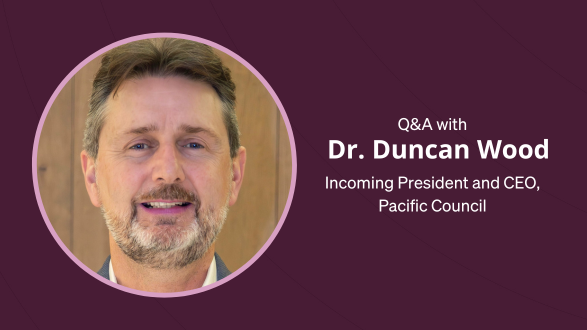Q&A with Dr. Duncan Wood
What drew you to join the Pacific Council as the new President and CEO?
The Pacific Council has been a force for enhancing understanding of and engagement in international policy debates on the West Coast for decades, and as such, I was delighted to be invited to apply for the position. The organization stands out as an authoritative voice from Los Angeles in national and global policy conversations, and I couldn’t wait to be part of it!
How do you plan to approach leadership and decision-making?
Throughout my career both in academia and think tanks, I have learned the value of team-based approaches to leadership. Of course, there are times when the individual leader needs to step up, but most of the time, it is vital to build and nurture a team that you can trust—one that is equipped with the skills and insights needed to achieve institutional goals.
In the case of the Pacific Council, this is not just the staff—it’s working closely with the Board, the Pacific Council members, and the broader community of stakeholders to ensure we deepen our impact.
What changes, if any, can members expect under your leadership?
My predecessors have done sterling work in building the organization and creating an international policy-focused community among its members. I am deeply grateful that I am inheriting such a healthy organization with such a vibrant community behind it. It is clear that the Pacific Council has been instrumental in inspiring an active conversation on international affairs in Los Angeles and the West Coast, and I very much want to continue that work.
What I hope to add is a new focus on generating policy papers and having a deeper impact on international policy debates in Los Angeles, Washington, D.C., and beyond. This will require convening groups of experts from industry, civil society, and government, while producing timely, accessible, and insightful papers that we can take to decision makers to influence the policy process. I am excited about the opportunity to draw on the expertise and insights of the Los Angeles and West Coast community.
What steps will you take to ensure continuity and stability during the transition?
The first steps have already been taken—working closely with the Board, Dr. Jerrold Green, and the Pacific Council staff to ensure that the transition is smooth and respectful of both the traditions and culture of the Pacific Council as well as existing works in progress.
The next step will be to study the history of the Pacific Council and meet with stakeholders. It has struck me in my conversations thus far that engagement is fundamental to the work of the Pacific Council and that means it is imperative that the President gets to know the community as much as possible to facilitate greater involvement and interaction.
What opportunities do you see for the organization's growth and success?
I very much want to ensure that the Pacific Council is seen as the preeminent international affairs think tank on the West Coast. This means increasing our output in terms of policy papers, building our media presences, and developing partnerships across the United States and the world. The combination of our geographic location and economic interests from a diverse West Coast megacity means that we can bring a unique perspective to global affairs. The opportunity lies in incorporating that perspective into the policy debates that take place not only in LA but in Washington, D.C. and other global capitals.
What inspired you to pursue a career in International Policy?
As an undergrad, international relations gave me the most excitement in my studies and that continued into my graduate work. But as an academic I quickly became frustrated with the fact that I was speaking to a very limited audience and that my ideas were grounded in theory rather than practice.
My early experiences in Mexico with the policy process surrounding the opening of the energy sector gave me a glimpse of what was possible by combining academic training with real-world policy considerations. I then jumped into the deep end of policy debates when I started working at the Wilson Center in Washington, D.C.. There I learned the importance of communication, of immersing myself in the policy community, and of bringing together three variables in my work: policy relevance, funding opportunities, and the intellectual capital needed to add to the debate.
What do you most look forward to living in Los Angeles?
I am so excited to become part of the Pacific Council community! I have moved many times in my adult life and each time I have immersed myself in the local community and embraced the local perspective on global affairs. As the incoming President and CEO, I am looking forward to meeting the members, getting to know the team, and educating myself on the global affairs priorities and perspectives of Angelenos.
What are you reading/watching right now?
Reading: Blood Gun Money: How American Arms Gangs and Cartels; and Fire Weather: A True Story from a Hotter World.
Watching: A Gentleman in Moscow. The book was fantastic!




